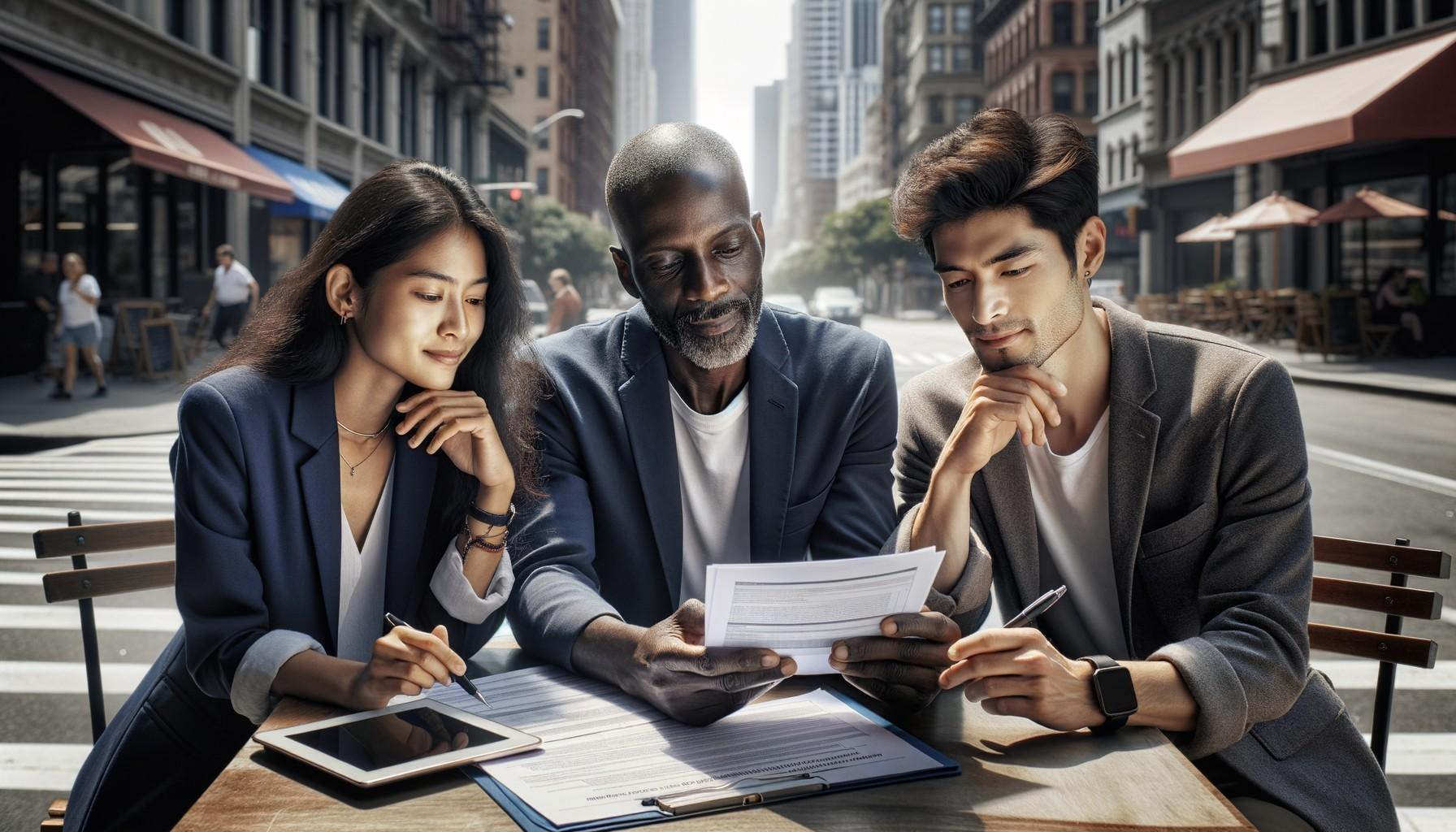
Fiancé Visa Interview: Common Questions and Answers
Preparing for a fiancé visa interview can be daunting, but understanding common fiancé visa interview questions and answers is key to success.
At Law Offices of Jeffrey A. Thompson, we’ve helped numerous couples navigate this crucial step in their immigration journey.
This guide will walk you through the essential aspects of the interview process, from document preparation to handling typical questions about your relationship and future plans.
How to Ace Your Fiancé Visa Interview Preparation
Compile Your Documentation
Start your preparation by collecting all necessary documents. This includes your passport, birth certificate, police records, and financial statements. Don’t forget to gather photos of you and your fiancé together, as well as evidence of your ongoing communication. Applicants should take to the visa interview clear, legible photocopies of civil documents and translations, such as birth and divorce certificates. U.S. Citizenship and Immigration Services (USCIS) requires couples to provide proof of meeting in person within the last two years. This could include flight tickets, hotel reservations, or even social media posts from your time together.
Create a Comprehensive Relationship Timeline
Construct a detailed timeline of your relationship. Note key dates such as when you first met, important milestones, and your engagement. Prepare to discuss these events in depth. The U.S. Department of State emphasizes that consular officers look for genuine relationships. A well-organized timeline can help you articulate your story clearly and confidently.
Master Common Interview Questions
Familiarize yourself with typical interview questions. These often include inquiries about your fiancé’s background, your shared future plans, and details about your relationship. Practice answering these questions out loud. This not only helps you formulate clear responses but also builds your confidence for the actual interview.
Understand the Interview Process
Learn about the interview process itself. Interviews typically last about 10 minutes and take place in a private room at a U.S. embassy or consulate. Only the foreign fiancé is required to attend (although policies may vary by consulate). Knowing what to expect can help reduce anxiety and improve your performance.
Prepare for Potential Challenges
Anticipate potential challenges or difficult questions. If there are any aspects of your relationship or background that might raise concerns (such as a significant age difference or language barrier), be ready to address them honestly and directly. You will need to file a Form I-129F, Petition For Alien Fiancé(e). This is the first step to obtaining a K-1 nonimmigrant visa for your fiancé(e).
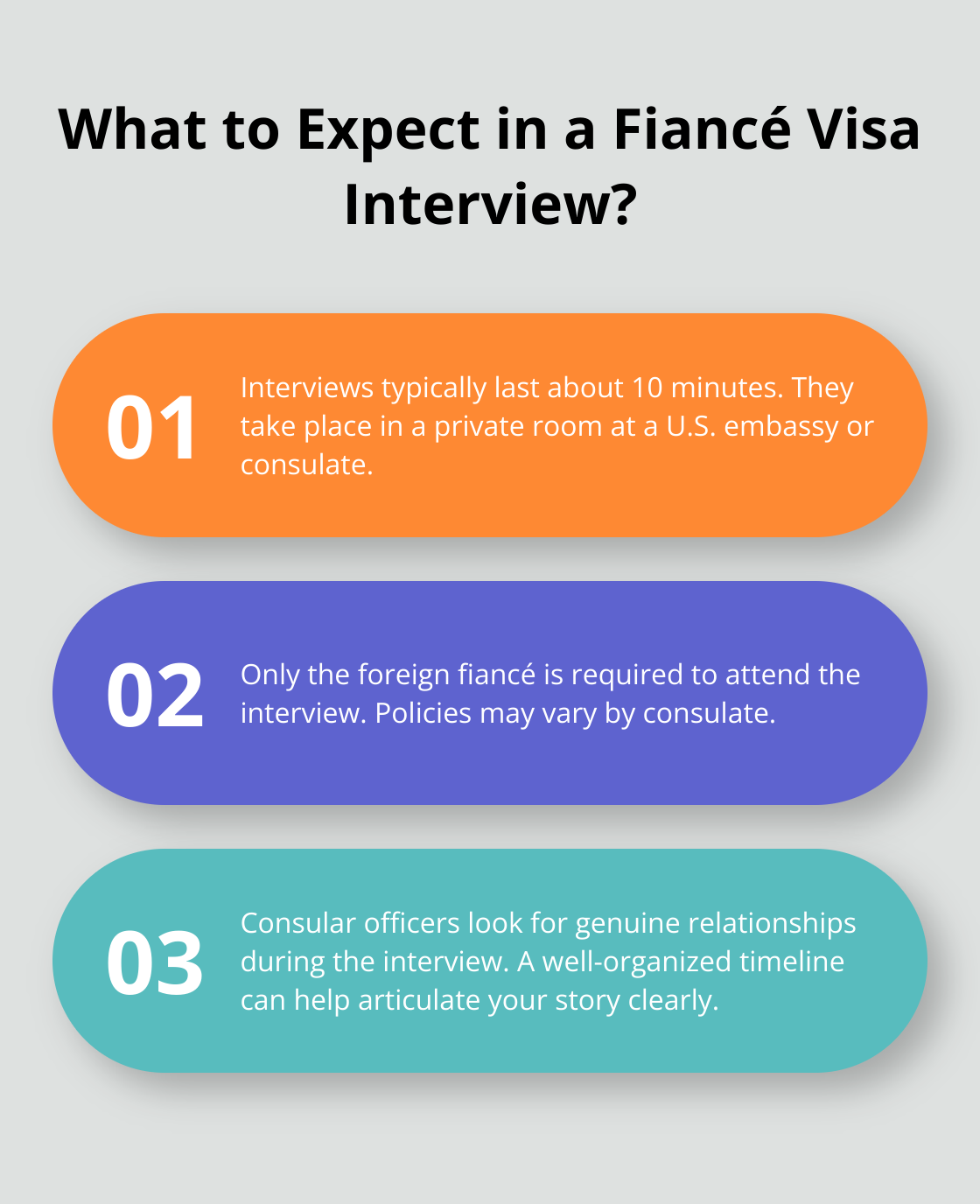
As you move forward in your preparation, it’s important to consider the specific questions you might face during your interview. Let’s explore some of the most common fiancé visa interview questions and how to approach them effectively.
What Questions Will You Face in Your Fiancé Visa Interview?
The fiancé visa interview can challenge many applicants, but understanding the types of questions you’ll encounter can significantly increase your confidence. We’ve compiled insights on the most common questions you’re likely to face during your interview.
Questions About Your Relationship
The consular officer’s primary goal is to verify the authenticity of your relationship. They’ll ask about how you met, your shared experiences, and your communication habits. Prepare to discuss specific details about your first meeting, including the date, location, and circumstances. You might need to share your engagement story or explain how you’ve maintained your long-distance relationship.
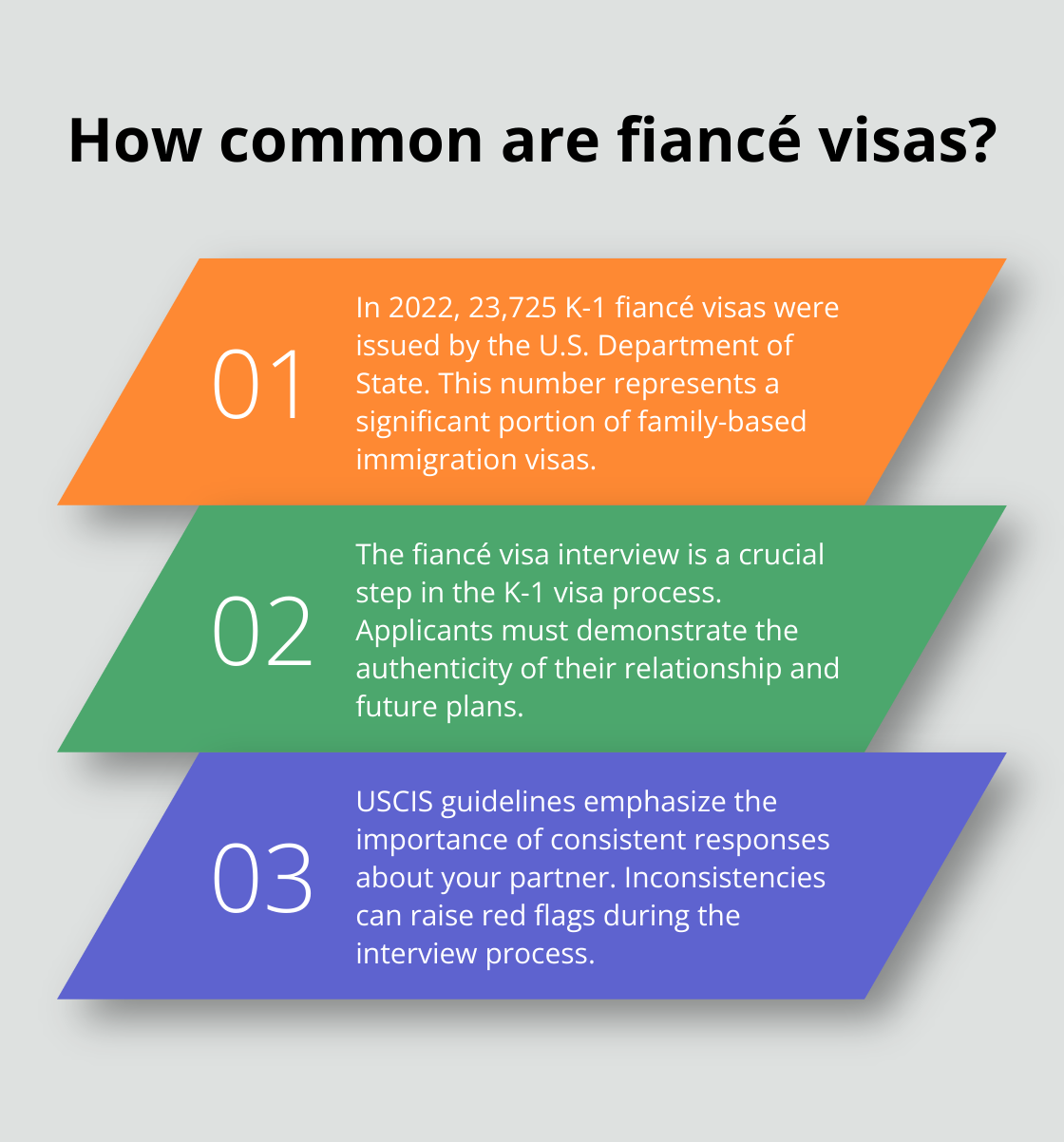
A typical question might be: “How often do you communicate, and through what means?” Provide concrete examples, such as daily video calls or weekly emails. The U.S. Department of State emphasizes the importance of demonstrating ongoing communication, so mention specific platforms or show message logs (if available).
For fiancé(e) visas, you may be required to print and fill out the Marriageable Statement Form. This form should only be signed during your interview.
Questions About Your Fiancé’s Background
You should expect questions about your fiancé’s personal and professional life. The interviewer may ask about their job, family, or hobbies. You should know how to discuss your fiancé’s education, career goals, and family structure. For instance, you might hear questions like, “What does your fiancé do for a living?” or “How many siblings does your fiancé have?”
It’s important to know these details accurately. According to USCIS guidelines, inconsistencies in responses about your partner can raise red flags. If there are aspects of your fiancé’s life you’re unsure about, it’s better to admit this than to guess incorrectly.
Questions About Your Future Plans
The interview will likely include questions about your plans after marriage. Prepare to talk about where you’ll live, your career aspirations, and any plans for starting a family. The consular officer wants to see that you’ve thought seriously about your future together.
You might hear questions like, “Where do you plan to live after getting married?” or “Have you discussed having children?” Recent recommendations to USCIS suggest addressing the human consequences suffered by applicants, families, and employers during the visa process.
Honesty is paramount in these interviews. If you’re unsure about certain aspects of your future, it’s okay to say so. The key is to demonstrate that you’ve had meaningful discussions about your life together and are committed to building a shared future.
We recommend practicing these questions with your fiancé before the interview. This preparation can help you provide consistent, confident answers, increasing your chances of a successful outcome in your fiancé visa process.
As you prepare for these questions, it’s also important to consider how you’ll present yourself during the interview. Let’s explore some tips for making a positive impression and navigating the interview successfully.
How to Ace Your Fiancé Visa Interview
Present Yourself Professionally
First impressions count. Dress as if you attend a job interview. This means business casual attire at minimum. Avoid flashy jewelry or excessive makeup. Your appearance should reflect the seriousness with which you approach this process.
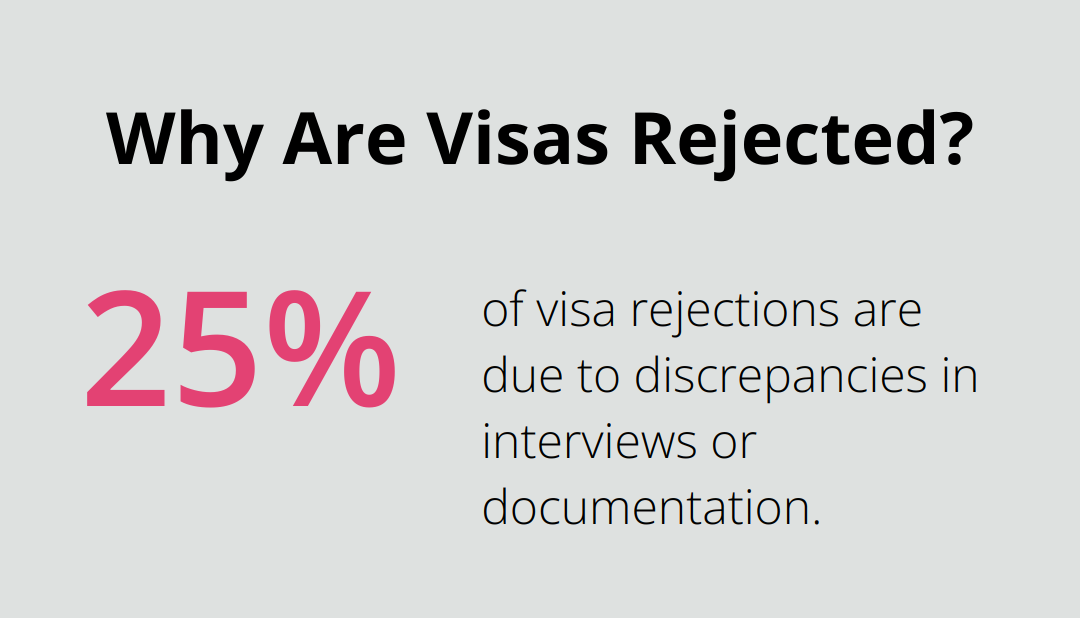
Arrive at least 30 minutes early. This buffer time allows for unexpected delays and helps you feel more relaxed. Bring a folder with all your documents neatly organized. This level of preparation demonstrates your commitment and respect for the process.
Maintain Composure and Clarity
Nervousness is natural, but excessive anxiety can hinder your performance. Practice deep breathing exercises before the interview to calm your nerves. Speak clearly and at a moderate pace. If you don’t understand a question, politely ask for clarification.
Make eye contact with the interviewer. This conveys confidence and honesty. If you need a moment to think about an answer, it’s okay to pause briefly. It’s better to take a second to collect your thoughts than to rush into an inaccurate response.
Prioritize Honesty and Consistency
Honesty is essential. The U.S. Department of State reports that visa fraud (including marriage fraud) is a serious concern. Any inconsistencies or dishonesty can lead to immediate denial and potential legal consequences.
If there are challenging aspects of your relationship or background, address them upfront. For example, if you have a significant age difference, prepare to explain how you navigate this in your relationship. Transparency about potential red flags often works in your favor.
Consistency is equally important. Ensure that your answers align with the information provided in your application and with your fiancé’s responses. Discrepancies in interviews or documentation lead to 25% of rejections. Every detail matters: dates of meetings, shared experiences, and future plans.
Practice Common Questions
Try to anticipate and practice answering common interview questions. This preparation can boost your confidence and help you provide clear, concise responses. Some typical questions include:
- How did you meet your fiancé?
- What are your plans after marriage?
- What do you know about your fiancé’s family?
Practice these questions with a friend or family member to simulate the interview environment.
Bring Supporting Documentation
Organize and bring all required documents (passport, birth certificate, financial statements, etc.). Also, consider bringing additional supporting evidence of your relationship, such as:
- Photos of you and your fiancé together
- Travel itineraries from visits
- Communication records (e.g., emails, chat logs)
Having these documents readily available can help support your answers and demonstrate the authenticity of your relationship.
Final Thoughts
The fiancé visa interview process challenges many applicants, but thorough preparation and understanding of common fiancé visa interview questions and answers will boost your confidence. We recommend you gather all necessary documents, create a comprehensive relationship timeline, and practice answering potential questions. Maintain a professional demeanor, stay calm, and speak clearly during the interview.
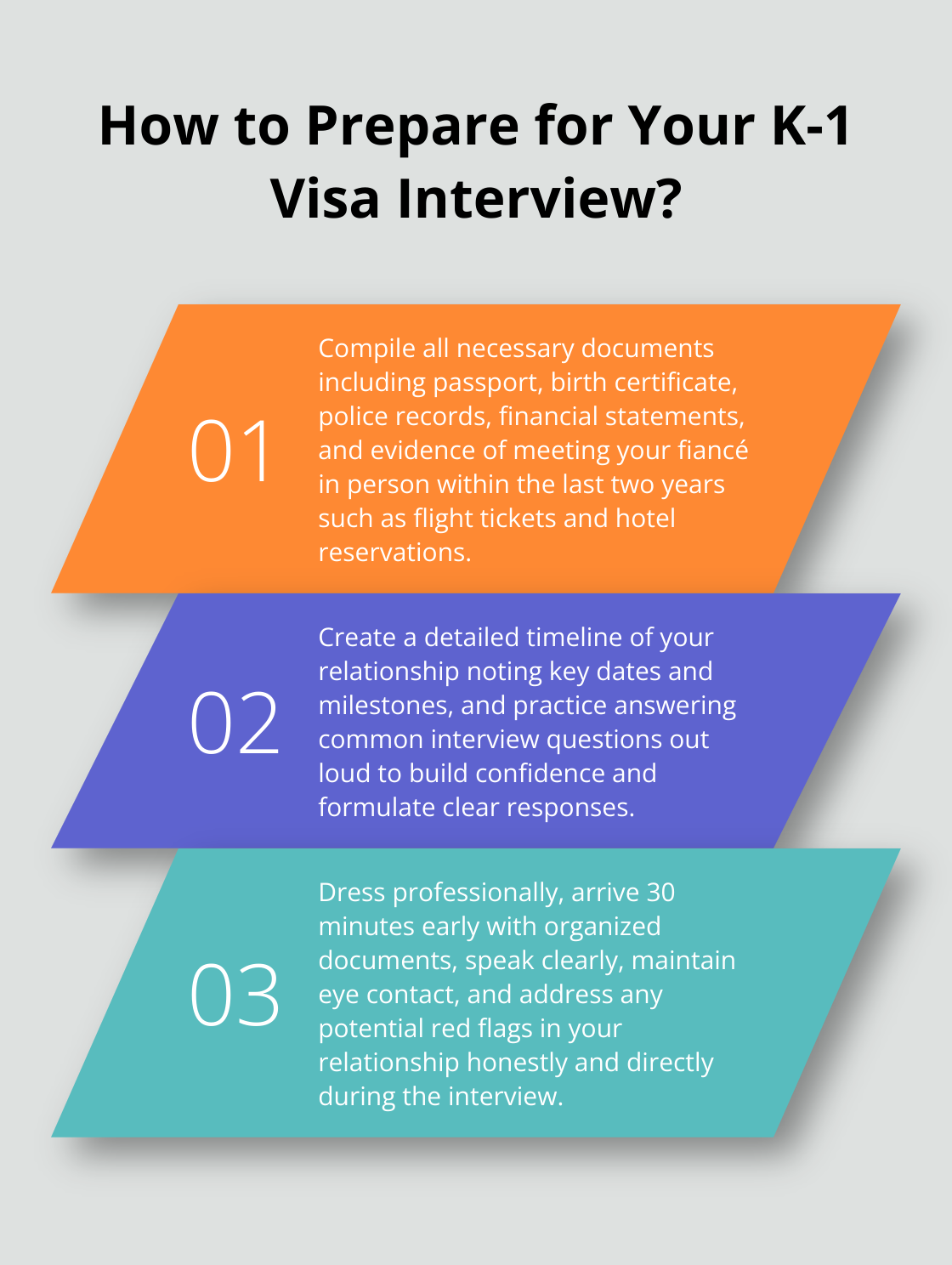
Honesty and consistency play a vital role in your application’s success. Support your answers with concrete examples and prepare to provide additional documentation if requested. The interview offers an opportunity to demonstrate the strength and authenticity of your relationship.
At Law Offices of Jeffrey A. Thompson, we specialize in immigration law and can provide expert guidance throughout your fiancé visa journey. Our experienced team can help you prepare for the interview, assist with paperwork, and address legal hurdles (if any arise). We stand ready to support you in taking the next step towards building your life together in the United States.
